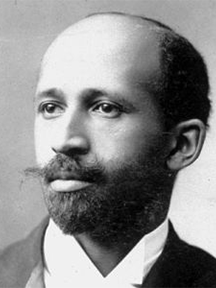By Malcolm Morse
The first African-American to earn his doctorate from Harvard University in 1895, William Edward Burghardt Du Bois exemplified the values of the Phi Beta Kappa Society through his life-long dedication to the pursuit of knowledge. More importantly, he did not pursue knowledge for knowledge’s sake, but wanted to examine American society and provide poignant critiques with the hope that if social ills could be exposed through scholarly research, then the country could begin taking steps toward alleviating these issues.
Du Bois considered scholarly critique to be the key to a healthy democratic society; not as a mere surface level examination of the affairs of the nation, but a deep analysis of social phenomena and their root causes. He believed that a social issue, like poverty or disenfranchisement, affects the entire American population, and he implored citizens to see the interconnectivity between all sectors of society to minimize deflection.
The deflection of responsibility for existing societal problems tarnishes the hands of those who believe that their own problems are not interconnected with the problems facing other groups. In Souls of Black Folk, Du Bois criticized the “Cast Down Your Bucket” philosophy of his contemporary, Booker T. Washington, saying that it “has tended to make the whites, North and South, shift the burden of the Negro race to the Negro’s shoulders and stand aside as critical and rather pessimistic spectators.” He prescribed “candid and honest criticism” for the South during a time where egregious human rights violations were commonplace as African-Americans lived with a constant fear of being lynched, assaulted, raped, unjustly imprisoned, and humiliated by their white American counterparts.
In Du Bois’ eyes, these terrible acts were not unrelated events that occured in a vacuum but the outcomes of a social system of oppression. He believed that the duty of a scholar is to question society and critique systemic outcomes. Societal issues are systemic and taking a critical look at them includes questioning the moral values and integrity of the nation, which is the duty that Du Bois charged all Americans to take on as citizens, including those in academia.
At the dawn of the twentieth century, Dubois felt that the production of social critics among young African-Americans was threatened by the gradual yet noticeable decline in liberal education being offered to undergraduate students at Historically Black Colleges and Universities. He argued for the significance of providing liberal arts education at these institutions, a principle which can be broadened to include all institutions of higher learning in the country.
Du Bois said that the “imperative duty of thinking [black] men” is to be critical of the leaders of their communities and legislations. He characterized Washington’s academic program at Tuskegee as “naturally taking an economic cast, becoming a Gospel of Work and Money to such an extent as apparently almost completely to overshadow the higher aims of life.”
Focusing on professional training is not necessarily a negative development, but Du Bois simply warned against the simultaneous neglect of the liberal arts and the “concentration [of] all their energies on industrial education and the accumulation of wealth.” Du Bois suggested that with the focus on building wealth, one does not have the luxury to sit back and criticize society especially when those in power control many of the gateways to financially lucrative avenues.
With fewer students receiving a liberal arts education, there will be less people in the country who are thinking than those who are making money. For Du Bois, the former was more important to the healthy state of a democracy than the latter, for gaining economic wealth does not tackle the elimination of social ills. In other words, one cannot truly solve a social issue with an economic solution; only honest criticism on a large scale can do that.
Du Bois earned his initial bachelor’s degree from Fisk University, studied at the Humboldt University in Berlin, and lectured at Wilberforce University, Atlanta University (now Clark-Atlanta University) and the University of Pennsylvania. While in Pennsylvania, he pioneered the first sociological study of an urban community and published it as “The Philadelphia Negro: A Social Study” (1899).




